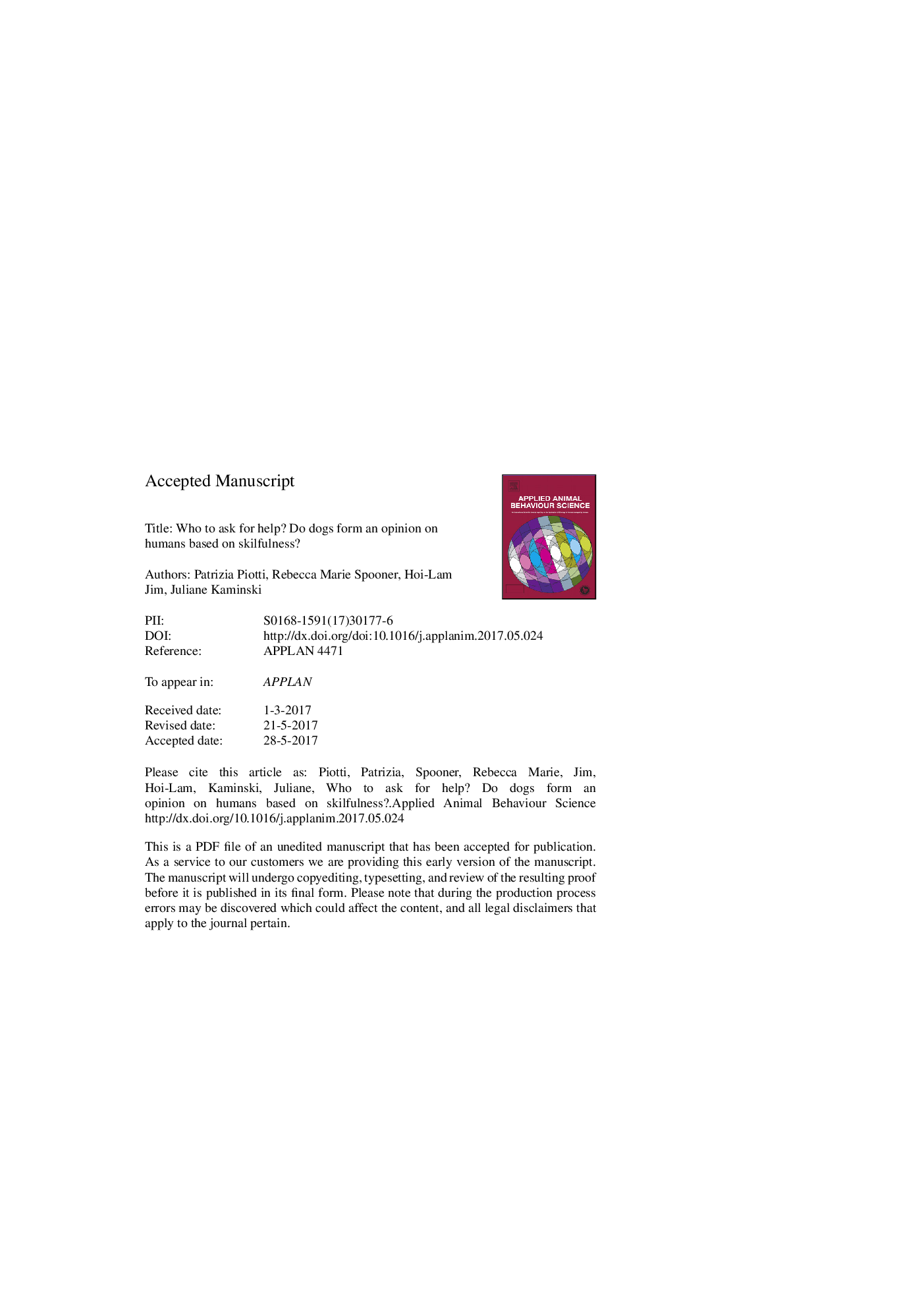| کد مقاله | کد نشریه | سال انتشار | مقاله انگلیسی | نسخه تمام متن |
|---|---|---|---|---|
| 5763253 | 1625311 | 2017 | 36 صفحه PDF | دانلود رایگان |
عنوان انگلیسی مقاله ISI
Who to ask for help? Do dogs form an opinion on humans based on skilfulness?
ترجمه فارسی عنوان
چه کسی برای کمک بخواهد؟ آیا سگ ها بر اساس مهارت تمرکز می کنند؟
دانلود مقاله + سفارش ترجمه
دانلود مقاله ISI انگلیسی
رایگان برای ایرانیان
کلمات کلیدی
شهرت، وظیفه غیر قابل حل، مرجع نگاهی به گذشته، سگ، درخواست راهنما
موضوعات مرتبط
علوم زیستی و بیوفناوری
علوم کشاورزی و بیولوژیک
علوم دامی و جانورشناسی
چکیده انگلیسی
Reputation is considered a fundamental mechanism for cooperation. Dogs can use their direct experience to form reputation judgments about humans that are either nice or not towards others, however it is unknown if dogs can take skilfulness into account when requesting human help. Here, we investigated reputation formation based on human skilfulness. In study 1, 32 adult pet dogs witnessed four blocks of two demonstration types: a skilful experimenter succeeded in solving a puzzle and obtaining food for the dog, while an unskilful experimenter failed. Each block was followed by an unsolvable task trial, where the dogs were presented a container baited with food that was inaccessible to the dog. During the task, the experimenters stood on either side of the container. Referential looks towards each experimenter were recorded. Dogs did not choose the skilful experimenter above chance and did not prefer the skilful experimenter over the unskilful one. In order to simplify the task and avoid carryover effects, in a second study dogs only witnessed one type of demonstration and were then tested in a single unsolvable task trial. To further simplify the demonstrations, the experimenter either skilfully helped the dog (skilful demonstration), or did not help the dog at all (no-help demonstration). Forty-eight dogs were allocated to one of four demonstration groups: demonstrations could be either skilful or with no-help (“skilfulness” variable) and nice or ignoring (“quality of interaction” variable). Dogs' looking back behaviour did not differ in any of the conditions. However, when pooling the “quality of interaction” groups to compare the two “skilfulness” groups, a trend towards significance was observed between the duration of looking in the skilful group and the non-helpful group (Wilcoxon signed rank test: Mdnskilful = 9.20, interquartile range 3.98-20.65; Mdnno-help = 4.90 interquartile range 1.35-8.58, T = 1.93, p = 0.05, r = â0.39). The results should be considered cautiously and cannot confirm that dogs could take skilfulness into account when looking referentially at humans for help, or use the information to evaluate them in this specific context.
ناشر
Database: Elsevier - ScienceDirect (ساینس دایرکت)
Journal: Applied Animal Behaviour Science - Volume 195, October 2017, Pages 93-102
Journal: Applied Animal Behaviour Science - Volume 195, October 2017, Pages 93-102
نویسندگان
Patrizia Piotti, Rebecca Marie Spooner, Hoi-Lam Jim, Juliane Kaminski,
